Abstract
Aims—To determine possible associations between p53 allelic deletion, c-Ki-ras mutational activation, immunohistochemical detection of p53 and ras proteins, various clinicopathological variables, and patient outcome in 168 Dukes' stage B colorectal carcinomas.
Methods—Allelic deletion at the p53 tumour suppressor gene locus was detected using polymerase chain reaction (PCR) based loss of heterozygosity (LOH) assays. Overexpressed proteins were detected using the CM1 polyclonal antibody. A PCR based assay was used to detect the presence of activating mutations at codon 12 of c-Ki-ras. Immunostaining was carried out using a monoclonal antibody to p21ras.
Results—p53 LOH, CM1 immunostaining, c-Ki-ras mutational activation, and p21ras immunostaining were not predictive of survival by logrank analysis. Multivariate analysis using Cox regression did not predict survival in this group of tumours.
Conclusions—Aberrations in ras and p53 are unlikely to play an important role in the subdivision of patients with Dukes' stage B colorectal carcinoma into more accurate prognostic strata. It is possible that later genetic events are more important in conferring a specific phenotype on the resultant Dukes' stage B tumour.
Keywords: p53
Keywords: ras
Keywords: Dukes' stage B colorectal carcinoma
Keywords: survival
Full text
PDF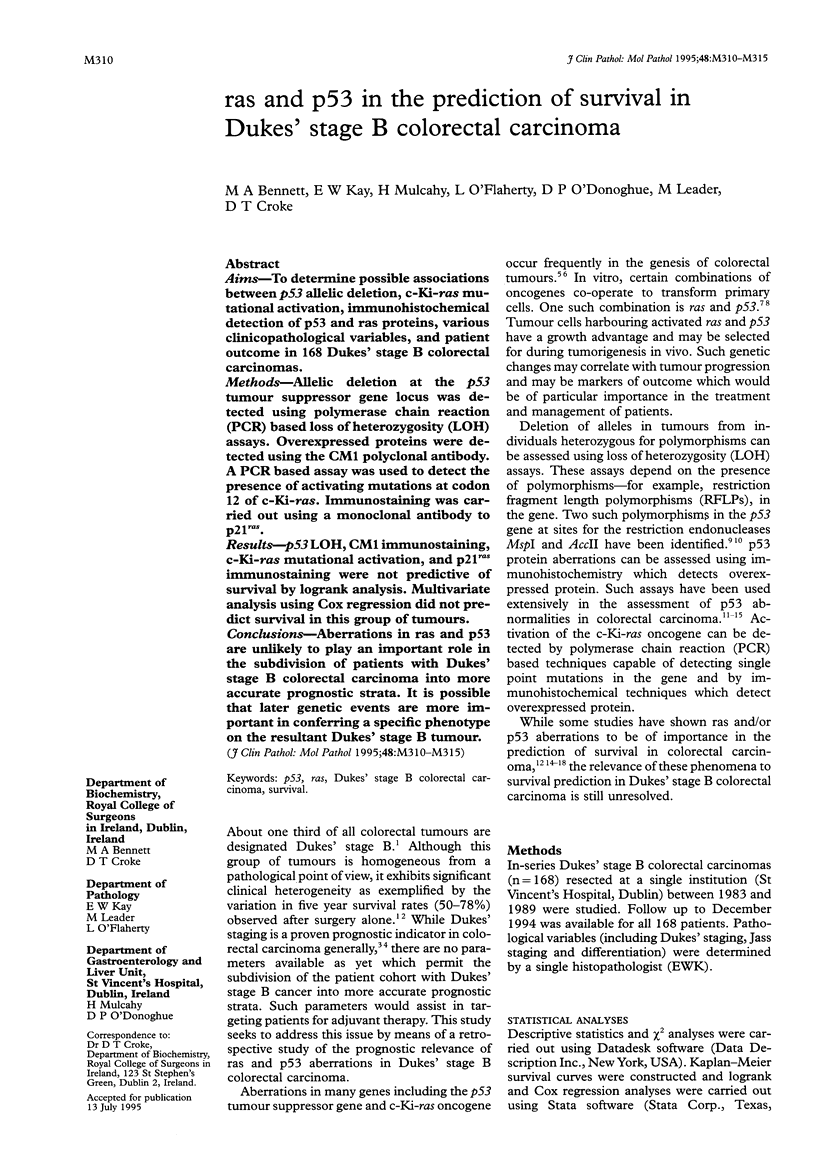
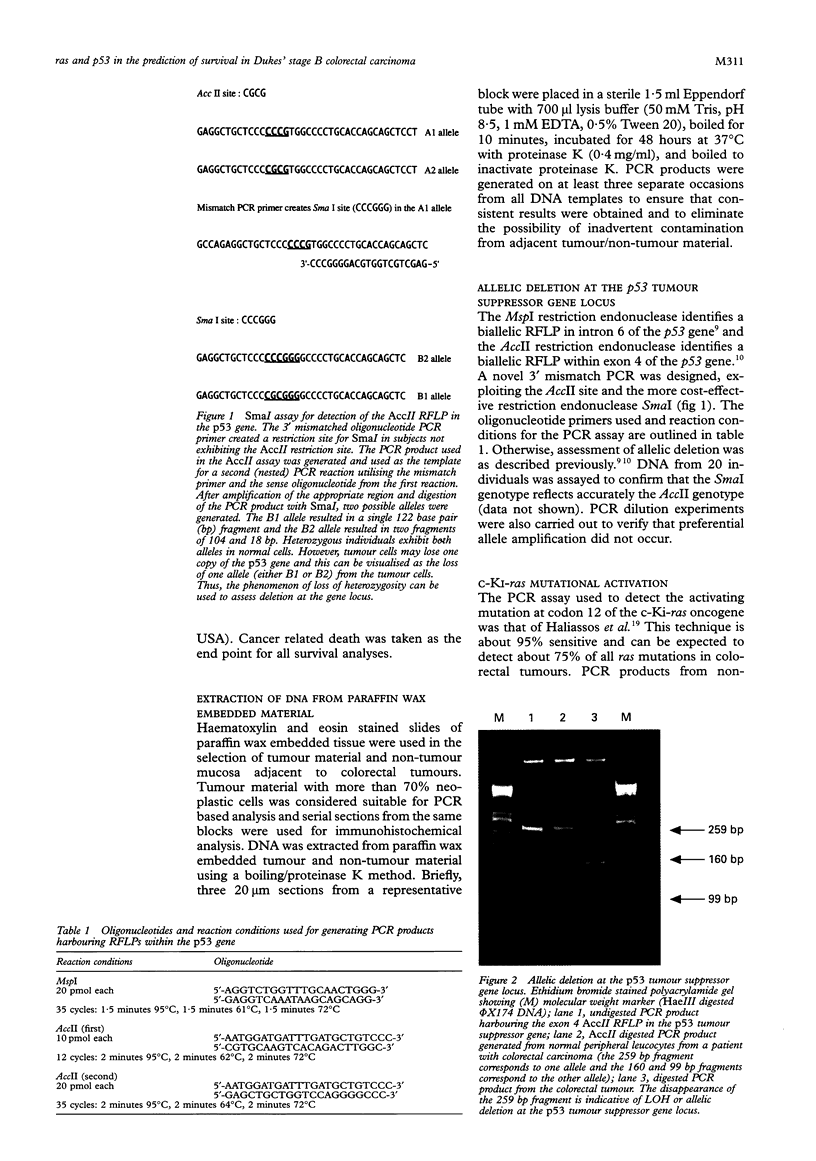
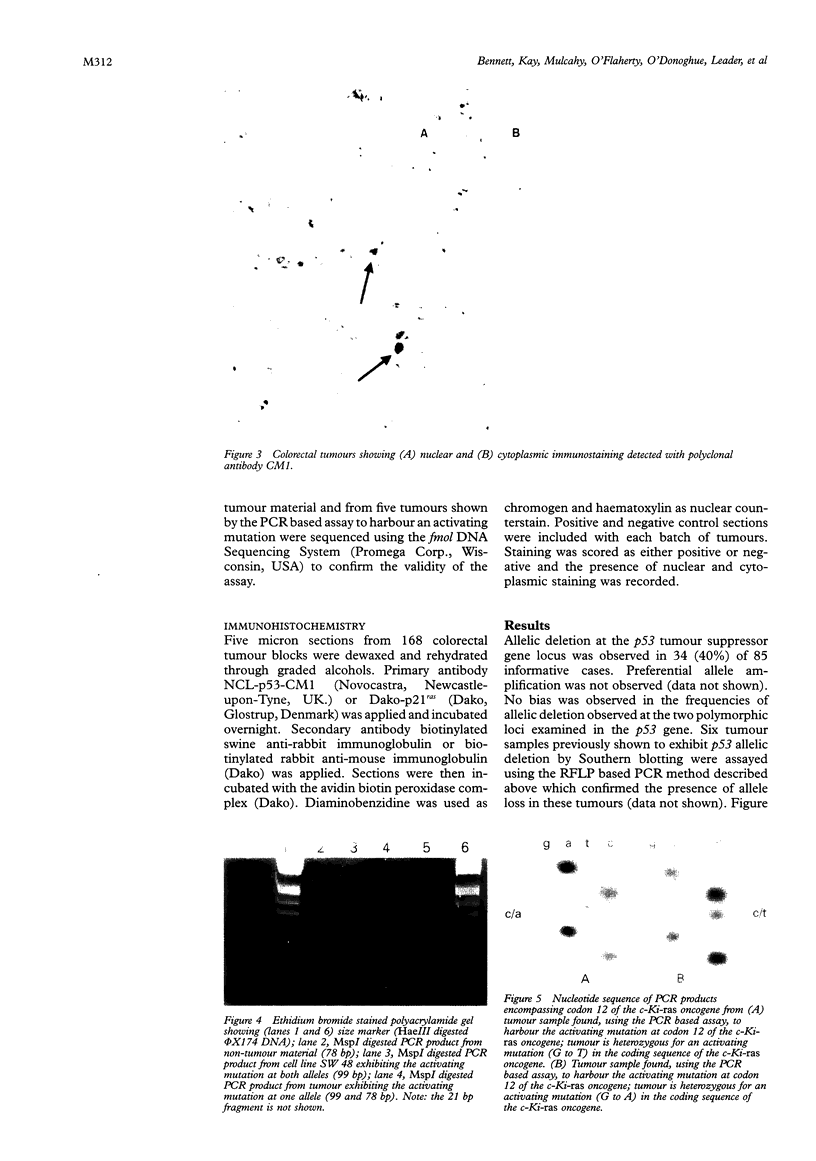
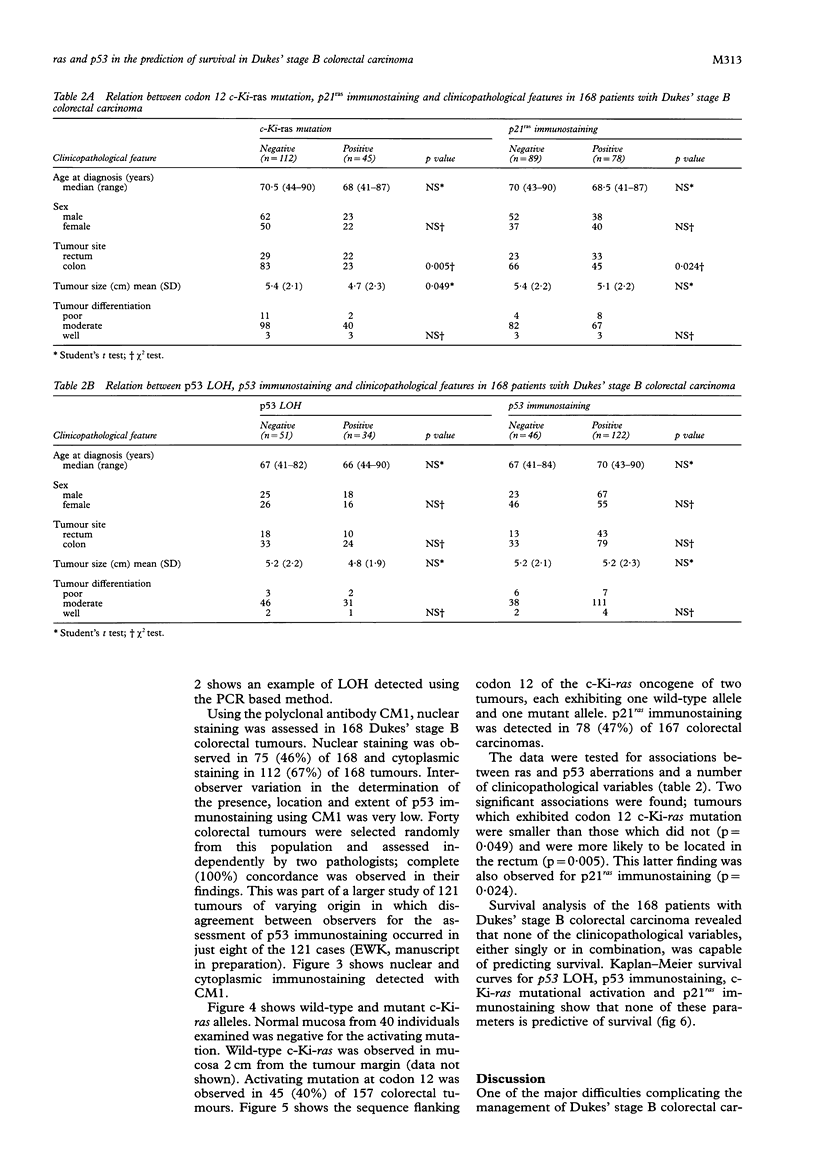
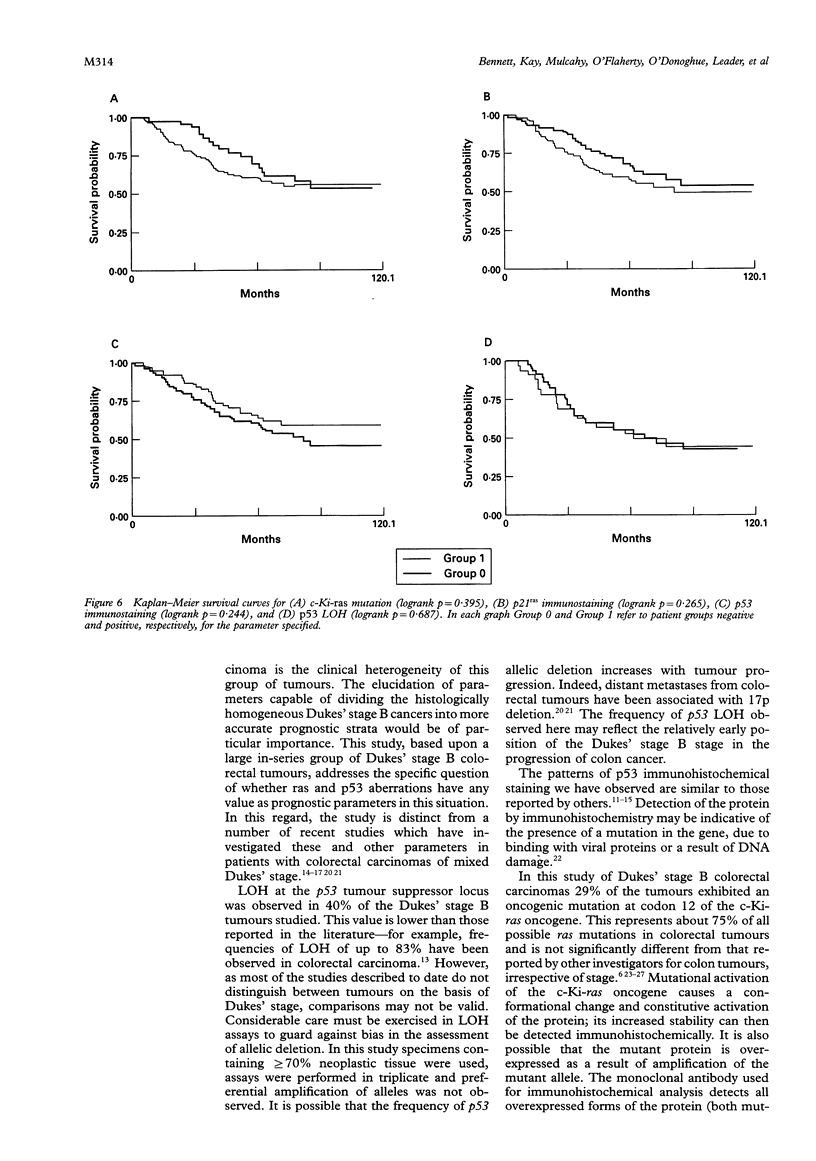
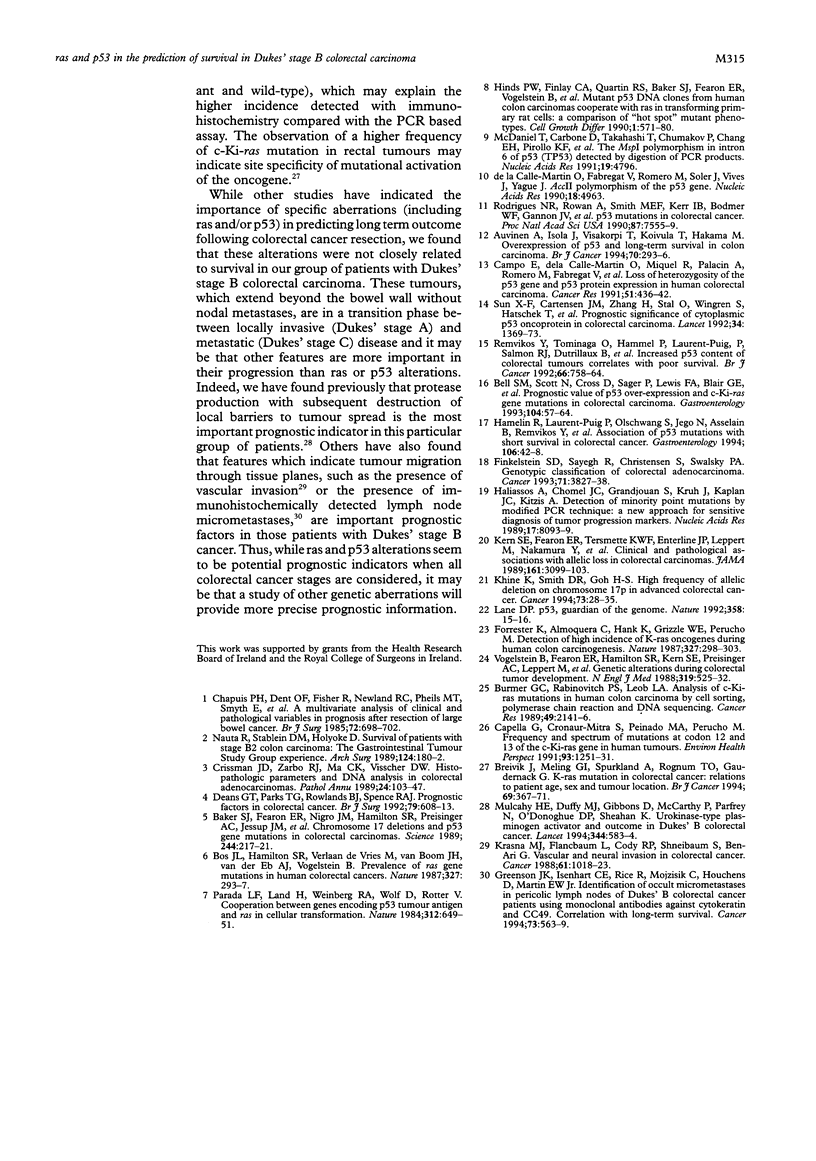
Images in this article
Selected References
These references are in PubMed. This may not be the complete list of references from this article.
- Auvinen A., Isola J., Visakorpi T., Koivula T., Virtanen S., Hakama M. Overexpression of p53 and long-term survival in colon carcinoma. Br J Cancer. 1994 Aug;70(2):293–296. doi: 10.1038/bjc.1994.295. [DOI] [PMC free article] [PubMed] [Google Scholar]
- Baker S. J., Fearon E. R., Nigro J. M., Hamilton S. R., Preisinger A. C., Jessup J. M., vanTuinen P., Ledbetter D. H., Barker D. F., Nakamura Y. Chromosome 17 deletions and p53 gene mutations in colorectal carcinomas. Science. 1989 Apr 14;244(4901):217–221. doi: 10.1126/science.2649981. [DOI] [PubMed] [Google Scholar]
- Bell S. M., Scott N., Cross D., Sagar P., Lewis F. A., Blair G. E., Taylor G. R., Dixon M. F., Quirke P. Prognostic value of p53 overexpression and c-Ki-ras gene mutations in colorectal cancer. Gastroenterology. 1993 Jan;104(1):57–64. doi: 10.1016/0016-5085(93)90835-z. [DOI] [PubMed] [Google Scholar]
- Bos J. L., Fearon E. R., Hamilton S. R., Verlaan-de Vries M., van Boom J. H., van der Eb A. J., Vogelstein B. Prevalence of ras gene mutations in human colorectal cancers. 1987 May 28-Jun 3Nature. 327(6120):293–297. doi: 10.1038/327293a0. [DOI] [PubMed] [Google Scholar]
- Breivik J., Meling G. I., Spurkland A., Rognum T. O., Gaudernack G. K-ras mutation in colorectal cancer: relations to patient age, sex and tumour location. Br J Cancer. 1994 Feb;69(2):367–371. doi: 10.1038/bjc.1994.67. [DOI] [PMC free article] [PubMed] [Google Scholar]
- Burmer G. C., Rabinovitch P. S., Loeb L. A. Analysis of c-Ki-ras mutations in human colon carcinoma by cell sorting, polymerase chain reaction, and DNA sequencing. Cancer Res. 1989 Apr 15;49(8):2141–2146. [PubMed] [Google Scholar]
- Chapuis P. H., Dent O. F., Fisher R., Newland R. C., Pheils M. T., Smyth E., Colquhoun K. A multivariate analysis of clinical and pathological variables in prognosis after resection of large bowel cancer. Br J Surg. 1985 Sep;72(9):698–702. doi: 10.1002/bjs.1800720909. [DOI] [PubMed] [Google Scholar]
- Crissman J. D., Zarbo R. J., Ma C. K., Visscher D. W. Histopathologic parameters and DNA analysis in colorectal adenocarcinomas. Pathol Annu. 1989;24(Pt 2):103–147. [PubMed] [Google Scholar]
- Deans G. T., Parks T. G., Rowlands B. J., Spence R. A. Prognostic factors in colorectal cancer. Br J Surg. 1992 Jul;79(7):608–613. doi: 10.1002/bjs.1800790706. [DOI] [PubMed] [Google Scholar]
- Finkelstein S. D., Sayegh R., Christensen S., Swalsky P. A. Genotypic classification of colorectal adenocarcinoma. Biologic behavior correlates with K-ras-2 mutation type. Cancer. 1993 Jun 15;71(12):3827–3838. doi: 10.1002/1097-0142(19930615)71:12<3827::aid-cncr2820711207>3.0.co;2-n. [DOI] [PubMed] [Google Scholar]
- Forrester K., Almoguera C., Han K., Grizzle W. E., Perucho M. Detection of high incidence of K-ras oncogenes during human colon tumorigenesis. 1987 May 28-Jun 3Nature. 327(6120):298–303. doi: 10.1038/327298a0. [DOI] [PubMed] [Google Scholar]
- Greenson J. K., Isenhart C. E., Rice R., Mojzisik C., Houchens D., Martin E. W., Jr Identification of occult micrometastases in pericolic lymph nodes of Duke's B colorectal cancer patients using monoclonal antibodies against cytokeratin and CC49. Correlation with long-term survival. Cancer. 1994 Feb 1;73(3):563–569. doi: 10.1002/1097-0142(19940201)73:3<563::aid-cncr2820730311>3.0.co;2-d. [DOI] [PubMed] [Google Scholar]
- Haliassos A., Chomel J. C., Grandjouan S., Kruh J., Kaplan J. C., Kitzis A. Detection of minority point mutations by modified PCR technique: a new approach for a sensitive diagnosis of tumor-progression markers. Nucleic Acids Res. 1989 Oct 25;17(20):8093–8099. doi: 10.1093/nar/17.20.8093. [DOI] [PMC free article] [PubMed] [Google Scholar]
- Hamelin R., Laurent-Puig P., Olschwang S., Jego N., Asselain B., Remvikos Y., Girodet J., Salmon R. J., Thomas G. Association of p53 mutations with short survival in colorectal cancer. Gastroenterology. 1994 Jan;106(1):42–48. doi: 10.1016/s0016-5085(94)94217-x. [DOI] [PubMed] [Google Scholar]
- Hinds P. W., Finlay C. A., Quartin R. S., Baker S. J., Fearon E. R., Vogelstein B., Levine A. J. Mutant p53 DNA clones from human colon carcinomas cooperate with ras in transforming primary rat cells: a comparison of the "hot spot" mutant phenotypes. Cell Growth Differ. 1990 Dec;1(12):571–580. [PubMed] [Google Scholar]
- Kern S. E., Fearon E. R., Tersmette K. W., Enterline J. P., Leppert M., Nakamura Y., White R., Vogelstein B., Hamilton S. R. Clinical and pathological associations with allelic loss in colorectal carcinoma [corrected]. JAMA. 1989 Jun 2;261(21):3099–3103. doi: 10.1001/jama.261.21.3099. [DOI] [PubMed] [Google Scholar]
- Khine K., Smith D. R., Goh H. S. High frequency of allelic deletion on chromosome 17p in advanced colorectal cancer. Cancer. 1994 Jan 1;73(1):28–35. doi: 10.1002/1097-0142(19940101)73:1<28::aid-cncr2820730107>3.0.co;2-3. [DOI] [PubMed] [Google Scholar]
- Krasna M. J., Flancbaum L., Cody R. P., Shneibaum S., Ben Ari G. Vascular and neural invasion in colorectal carcinoma. Incidence and prognostic significance. Cancer. 1988 Mar 1;61(5):1018–1023. doi: 10.1002/1097-0142(19880301)61:5<1018::aid-cncr2820610527>3.0.co;2-h. [DOI] [PubMed] [Google Scholar]
- Lane D. P. Cancer. p53, guardian of the genome. Nature. 1992 Jul 2;358(6381):15–16. doi: 10.1038/358015a0. [DOI] [PubMed] [Google Scholar]
- McDaniel T., Carbone D., Takahashi T., Chumakov P., Chang E. H., Pirollo K. F., Yin J., Huang Y., Meltzer S. J. The MspI polymorphism in intron 6 of p53 (TP53) detected by digestion of PCR products. Nucleic Acids Res. 1991 Sep 11;19(17):4796–4796. doi: 10.1093/nar/19.17.4796-a. [DOI] [PMC free article] [PubMed] [Google Scholar]
- Mulcahy H. E., Duffy M. J., Gibbons D., McCarthy P., Parfrey N. A., O'Donoghue D. P., Sheahan K. Urokinase-type plasminogen activator and outcome in Dukes' B colorectal cancer. Lancet. 1994 Aug 27;344(8922):583–584. doi: 10.1016/s0140-6736(94)91968-2. [DOI] [PubMed] [Google Scholar]
- Nauta R., Stablein D. M., Holyoke E. D. Survival of patients with stage B2 colon carcinoma. The Gastrointestinal Tumor Study Group experience. Arch Surg. 1989 Feb;124(2):180–182. doi: 10.1001/archsurg.1989.01410020050008. [DOI] [PubMed] [Google Scholar]
- Parada L. F., Land H., Weinberg R. A., Wolf D., Rotter V. Cooperation between gene encoding p53 tumour antigen and ras in cellular transformation. Nature. 1984 Dec 13;312(5995):649–651. doi: 10.1038/312649a0. [DOI] [PubMed] [Google Scholar]
- Remvikos Y., Tominaga O., Hammel P., Laurent-Puig P., Salmon R. J., Dutrillaux B., Thomas G. Increased p53 protein content of colorectal tumours correlates with poor survival. Br J Cancer. 1992 Oct;66(4):758–764. doi: 10.1038/bjc.1992.352. [DOI] [PMC free article] [PubMed] [Google Scholar]
- Rodrigues N. R., Rowan A., Smith M. E., Kerr I. B., Bodmer W. F., Gannon J. V., Lane D. P. p53 mutations in colorectal cancer. Proc Natl Acad Sci U S A. 1990 Oct;87(19):7555–7559. doi: 10.1073/pnas.87.19.7555. [DOI] [PMC free article] [PubMed] [Google Scholar]
- Sun X. F., Carstensen J. M., Zhang H., Stål O., Wingren S., Hatschek T., Nordenskjöld B. Prognostic significance of cytoplasmic p53 oncoprotein in colorectal adenocarcinoma. Lancet. 1992 Dec 5;340(8832):1369–1373. doi: 10.1016/0140-6736(92)92558-w. [DOI] [PubMed] [Google Scholar]
- Vogelstein B., Fearon E. R., Hamilton S. R., Kern S. E., Preisinger A. C., Leppert M., Nakamura Y., White R., Smits A. M., Bos J. L. Genetic alterations during colorectal-tumor development. N Engl J Med. 1988 Sep 1;319(9):525–532. doi: 10.1056/NEJM198809013190901. [DOI] [PubMed] [Google Scholar]
- de la Calle-Martín O., Fabregat V., Romero M., Soler J., Vives J., Yagüe J. AccII polymorphism of the p53 gene. Nucleic Acids Res. 1990 Aug 25;18(16):4963–4963. [PMC free article] [PubMed] [Google Scholar]






